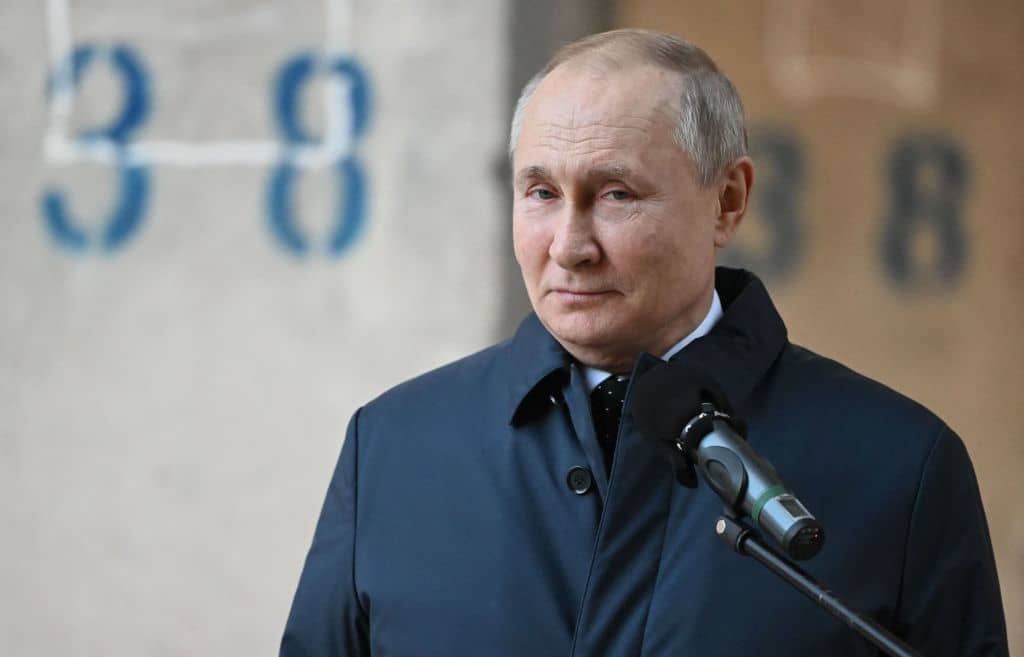Much has been made of what Putin has in common with Stalin. Both leaders brook no dissent: they subordinate truth to ideology and preserve their lies through terror. Yet such obvious parallels between these Russian leaders, past and present, matter less than their differences. Indeed, when trying to work out what makes Putin tick, there’s another figure from Russia’s past who serves as a more useful role model than Stalin: the Christian fascist Ivan Ilyin.
Back in 2005, Putin arranged for the reburial of Ilyin at Moscow’s Donskoi monastery, where those who fell foul of Stalin’s secret police were burned and buried. It was a mark of respect for Ilyin, a resolute opponent of communism, who died a year after Stalin. For years, his legacy had been in tatters. In communist Russia, after all, there was little place for Ilyin’s ideology. But when the USSR fell, Ilyin soon came to be seen in a new light.
His rehabilitation began in the dark days of 1990s Russia. Amidst the wreckage of post-Soviet Russia, Ilyin’s writings served as a call to arms for the resurrection of Russian imperial power. The means to this end was to be a strong, totalitarian leader Ilyin described as ‘the living organ of Russia, the instrument of self-redemption’, a ‘Tsar’ who would lead Russia ‘in the great historical battle between the servants of God and the forces of hell’.
When the USSR fell, Ilyin quickly came to be seen in a new light
Putin absorbed this vision as his political and spiritual duty. In his annual address to the Federal Assembly in 2006, Putin acknowledged his debt ‘to the famous Russian thinker Ivan Ilyin’. In 2014, Ilyin’s ‘Our Mission’ became required reading for Putin’s regional governors; Tatiana Saenko, a parliamentary deputy, quoted Ilyin to support the annexation of Crimea as a necessary prerequisite to the ‘rebirth and resurrection’ of Russia.
In the years since, Ilyin’s vision has been confirmed time and again by Putin’s playbook. On the eve of the invasion of Ukraine, Putin denied the existence of Ukraine. In doing so, he echoed Ilyin, who referred to ‘Ukrainians’ in quotation marks to signify their non-existence.
When the former president of Russia Dmitry Medvedev warned in recent days that Putin’s ambition in invading Ukraine was to ‘finally build an open Eurasia from Vladivostok to Lisbon’, he too was aligning himself with Ilyin and his successors. This includes men like Alexander Dugin, a former lecturer at Moscow State university, who has been labelled ‘Putin’s brain’.
In an interview with the Los Angeles Times in 2008, Dugin recalled his initial reservations about Putin. He criticised him for being ‘encircled by pro-Western, pro-liberal politicians and advisors and experts’ and condemned Putin’s support of the United States in the aftermath of 9/11. However, he also saw that, after the 2008 invasion of Georgia, Putin had passed an ‘irreversible point’. He declared that his support of Putin was ‘now absolute’.
For Dugin, the West – and the United States, in particular – is ‘the kingdom of the antichrist’. He believes the West wants to destroy Russia, to submerge it in ‘the abyss of chaos and corruption’. Fighting the West is more than a political necessity: it’s a divine calling.
Ensuring the absorption of Belarus, Kazakhstan and Ukraine into Russia then is merely the temporal part of Dugin’s vision. The more dangerous vision is of an apocalyptic battle between the forces of good (Russia) and evil (the West). The meaning of Russia is defined by this struggle where the ‘last thought of God’ will be realised through the Russian people. That thought is ‘the thought of the End of the World’. This vision of politics will not come about of its own volition. It will come about through war, which Dugin calls ‘the father of things’.
Seen in this light – and given Dugin’s influence over Putin – Russia’s aggression against its neighbours hardly comes as a surprise. When faced with this apocalyptic ideology, it’s as absurd to blame Nato for Putin’s war as it is to blame American foreign policy for radical Islamist ideology: religious fanaticism plays by its own rules.
This, then, is what the West must face up to as it confronts Putin. But if this looks bleak, there is some hope. Russia’s opponents are helped in their task by the inevitable end point of the totalitarianism taking hold under Putin: chaos. The desire for absolute control always turns into its opposite. Whether it happens sooner or later, Putin’s grip over his country is not sustainable. One day, it will come to an end.
There’s a chance that this chaos will cause Putin’s Russia to implode imminently. But if Putin does manage to cling on, there is another, more worrying prospect that could lie ahead. When the dictator’s motivation is millenarian, the end of the world becomes a triumph of foreign policy. In the early days of the Ukraine conflict, hours after Putin put his nuclear arsenal on ‘high alert’, a state TV presenter asked: ‘Why do we need a world if Russia is not in it?’.
A similar thought has no doubt occurred to Putin. Gradually, over the last twenty years, Putin’s messianic mindset has taken over. Putin’s roots may be in the KGB but his heart is in Eurasian eschatology. As the historian Timothy Snyder asked: ‘What robber would not prefer to be called a redeemer?’






Comments